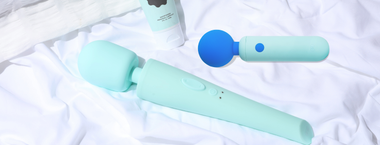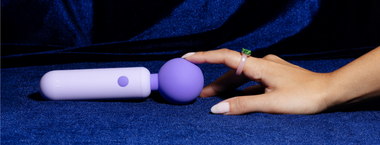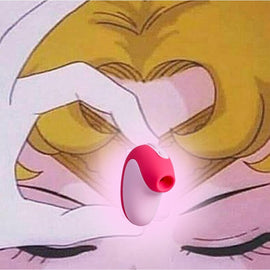EXPERT: How to Avoid Pain During Postpartum Sex

You did it. You had a baby! For roughly forty weeks you grew a person. That is insanity! I can’t even grow a succulent and you made a person! Yes, you had help (thanks, sperm!) but you carried that baby (or babies) around all by yourself. And then, as if that wasn’t magical enough, you delivered that baby. Either you pushed an entire person out of your vagina or you had a major surgery to bring your offspring into the world. Either scenario should warrant a parade, but instead, you are most likely home, freaking out that you now have a baby, and that you are responsible for its well being. No pressure.
In the midst of trying to take care of your new addition and any other family members, you hopefully remember to take care of yourself. Six weeks after you delivered your baby, you go to the doctor for your follow-up appointment. Typically, at this point, the doctor says: “Everything looks great! You and your vagina are doing well. You can return to having sex!”
Sex may be the last thing on your mind. That is typically what most of my patients tell me, and that totally makes sense. You are adjusting to a new routine with your little one. Many of you are developing a new understanding of “sleep deprivation.” Some are still feeling aches and pains from the delivery. Whatever you may be feeling, just know that it’s common and you are not alone. If you don’t want to have sex, don’t feel pressured to do so just because the doctor told you to go for it.
Take a moment and think about the changes your body went through. A lot had to happen to make a happy home for your baby: your uterus increased from roughly the size of an orange to the size of a watermelon! It takes roughly six weeks for it to return to pre-baby size, but that’s a big transformation...and that is only the uterus. The list of physiological changes is long, and everyone heals at a different rate, so if you don’t feel ready to have sex, listen to your body!
Now, it’s important to remember that sex does not just mean penetration. There are many options that fall under the umbrella term “sex.” You may be thinking of a few right now. Instead of counting sheep one night, maybe we should all start to count sexual activities. Although, that may lead to more restlessness, or maybe better dreams? Per usual, I digress. The bottom line is, don’t feel that sex has to mean penetration. There are plenty of ways to feel good with your partner or alone. Remember that communication is key. Tell your partner how you are feeling and what you are up for. Don’t feel that you have to do x, y or z to satisfy another person.
Use Lots of Lube for Penetrative Intercourse
If you are in the mood for penetrative intercourse, keep a few things in mind. Lube is key. In my opinion, lube is always a good idea, but for postpartum women, it is almost essential. This is primarily thanks to hormones, nature’s frenemies. Hormones helped your pregnancy progress and now they will continue to fluctuate as your body recovers, and as a result, it can cause a lack of vaginal lubricant. When you delivered your baby, your estrogen levels were at an all time high, and as soon as your baby came out those levels plummeted. Since your vulvar tissue is mediated by estrogen (and testosterone) this lack of estrogen can lead to vaginal dryness or pain with sex. If you decide to breastfeed, doing so can keep your estrogen levels low as well. Luckily, there are many high-quality water-based lubricants on the market, or coconut oil is another option. Keep in mind that coconut oil will degrade latex, so do not use it if you are using condoms.
Which leads to the next point: use protection! I hear many myths that you can’t get pregnant if you’re breastfeeding. False. You can. There are many birth control options, so make sure you consult with your healthcare provider to find the right one for you.
Take it Slow to Avoid Pain
As mentioned earlier, a small being came out of your body. (Which made me wonder if Ridley Scott had just witnessed a birth when he made Alien.) Your body went through significant changes, so take your time when you first attempt intercourse. If you had a c-section, an episiotomy or a perineal tear, you may have scar tissue that can cause pain with intercourse.
Around 85% of women experience perineal trauma (tearing) with delivery. This is not meant as a scare tactic, but rather to emphasize how important it is to go slow. It is helpful to know that pelvic floor physical therapy can address scar tissue-related hypomobility or hypersensitivity.
It is also important to go slow as those hormonal changes I mentioned can lead to pain with penetration. Remember, insufficient estrogen can cause vaginal dryness and can also cause hypersensitivity and pain. Pain with sex and sexual dysfunction is very common after having a baby. In a study of postpartum women in Australia, 64.3% of women reported sexual dysfunction in the first year following childbirth. In that same study, 39.4% reported pain with sex and 43.4% reported difficulty with lubrication. Talk to your doctor if you are having pain with sex. They may be able to prescribe medication that can help decrease your symptoms or they can refer you to a pelvic floor physical therapist who can help address the myofascial impairments that are contributing to your symptoms. If you are one of the many women that reports a lack of libido and/or diminished sexual satisfaction, you may benefit from working with a psychologist, sex therapist, or sex coach. Just remember that these symptoms are common, but they can be treated and should not be accepted as normal.
The moral of the story is that having a baby is tough. If you are struggling to get your groove back, are having pain with sex or are experiencing sexual dysfunction, just know that you are not alone and there are providers ready and waiting to help you. Myself included!
Dr. Rachel Gelman is a pelvic floor physical therapist with a bachelor’s degree in Biology from the University of Washington in Seattle and a Doctorate in Physical Therapy from Samuel Merritt University. Rachel practices as a clinical specialist at the Pelvic Health and Rehabilitation Center in San Francisco where she is also the branch director. She specializes in physical therapy management of numerous pelvic pain disorders, including sexual dysfunction. Rachel is passionate about women's and men's health and strives to promote quality education regarding sexual health both in the clinic and community.

Latest Articles

A Hot and Quick Guide to BV, UTIs, and Yeast Infections

9 Acts of Queer Resistance to Know in Addition to the Stonewall Riots










